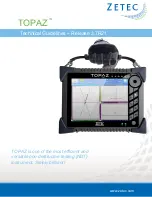
4
output current of the device can be calculated, and the overcurrent protection function can
be realized by comparing the amplitude of the measured current/voltage signal with the
set value.
IV. Basic operation
1) Detection of transformation ratio
1.Before connecting the power cord, first adjust the "current adjustment" handle
counterclockwise to the zero position. Connect the current output terminal to the primary
side of the current transformer under test, and connect it to the ammeter of the device on
the secondary side of the current transformer under test.
2. After the power is turned on, turn on the power switch of the instrument and set the
"Power Control" switch to the "ON" position, and the power indicator will light. Move the
selector switch to the required gear (series or parallel gear), and then turn the "current
adjustment" handle clockwise to call out the required output current, and then the
characteristic test of the device under test can be performed (the primary ammeter shows
the primary current at this time The secondary current meter displays the secondary
current at this time, and the transformation ratio of the transformer under test can be
calculated according to the primary and secondary current values). If the selector switch is
switched to the series gear, L2 and L3 should be short-circuited, and the output terminals
are L1 and L4. Output current is 500A
If the selector switch is selected in parallel mode, L1 and L2 should be short-circuited, L3
and L4 should be short-circuited. The output terminals are L1 and L3 or L2 and L4, and
the output current is 1000A.
3.When doing the impact test, you need to adjust the required current first, press the
"impact" switch to power off the equipment, and let go of the power supply, then you can
perform the impact test on the tested equipment.
V. Safety matters
(1) For the safety of the operator and the instrument, ensure that the instrument is well
grounded.
(2) Connect the ground wire first when preparing for the test, and remove the ground wire


























